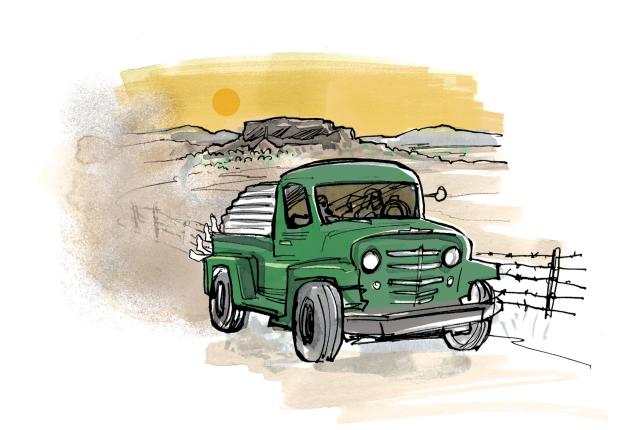Above: Illustration by Brett Affrunti.
LATE-1980S MIDSUMMER EVENINGS we would go irrigate the fields. Mama and Stepdad shoved their shovels into the bed of the dusty green 1952 Willys truck, the rounded shovel-shoulders skidding along the dented metal grooves of the truck-bed floor. When I got my first kid-size shovel from Cook’s, in Española, I hefted it in next to the big ones.
My brother, Porter, and I jumped in under the rounded topper that our mom made from extra roofing tin, and settled our shorted and sandaled kid-legs among the long tool handles. There was no space for kids in the front.
A washboard bumpy ride took us to the edge of our field in the Río Grande bosque. The truck turned tightly to cross the skinny bridge, and when we felt it stop, us kids jumped out to open the barbed-wire gate. I wound the leverage branch around the gatepost and pushed my little body against it, slipping the main wire loop off the top. The gate flopped to the ground with a puff of dust. Porter dragged it open for Mama to rumble her little truck through.
Me and Porter ran to the big red pipe wrench that lay in the leaves next to the headgate on the cement wall of the main ditch. Though I wanted to be the one to set the wrench in place and turn it slowly up and up, Porter was bigger and stronger, so he got to spin the big red handle while I counted off the turns. The cloudy water from the ditch sucked into the culvert pipe and traveled under the berm. Hearing the roar, we raced to the other side to feel the moist wind rush past our ears—the water misting, then gushing through.
Thirsty corn has thin arms, and thirsty beans and squash have heavy leaves. My stepdad meandered through the rows, checking for grasshoppers, growth, maybe raccoon or skunk damage. Mama with her shovel worked the channel at the top of the field. At the beginning of every row, she flipped the dirt dam into the main channel, preparing it for the coming flow. She did it effortlessly, one go, enough dirt perfectly placed to block the channel, no cleaning or fixing or filling. Professional.
The very first water flowed from the concrete, through the metal culvert, and into our dirt paths. It sniffed and searched its way around mud bumps, sticks, weeds, leaves, crops, finding the path of least resistance. Me and Porter skipped and shuffled along with it, moving the floating pieces of last year’s dried stalk out of the way. We scraped leaves or weeds up the sides of the trenches to keep the water moving, pulling kochia, goatheads, and sticker grasses from the bases of the thickening corn stalks. The water felt its way to the end of the row, painting the dry trough with a heavy wet hue that slowly absorbed up the sides, leaving a clear two-tone saturation line in the dirt. When the water got close to the end, we shouted to let Mama know she could close that row with her shovel and let the water flow to the next.
Read more: Go High—A southern New Mexican’s annual quest for elevation.
The real reason we went was because when we were done, when Mama closed up the last row and Porter squeaked the headgate to its resting position, we took off our shoes on the edge of the main ditch, rolled up our shorts, and slipped into the chilly, fast-moving ditchwater. Flat on our backs, we blocked the water with our shoulders and arms, letting it build up until it ran over our foreheads, slipped around our necks, pulled our hair down over our eyes, and flapped the ends of our T-shirts. We alligatored with our faces to the current, hands and knees down, crawling up then letting go to ride the ditch down, fingers and toes scratching at the moss that grew along the floor. It was slippery enough that if we weren’t careful, it could carry us so far we’d have a long barefoot walk back to our shoes.
Back in the truck bed with the shovels, the chilly evening wind dried us, our ditch-cleaned legs hung out over the rattling tailgate. Black Mesa got smaller and smaller, the dirt wake of road dimmed and shrank to a point as we headed home.


